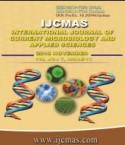


 National Academy of Agricultural Sciences (NAAS)
National Academy of Agricultural Sciences (NAAS)

|
PRINT ISSN : 2319-7692
Online ISSN : 2319-7706 Issues : 12 per year Publisher : Excellent Publishers Email : editorijcmas@gmail.com / submit@ijcmas.com Editor-in-chief: Dr.M.Prakash Index Copernicus ICV 2018: 95.39 NAAS RATING 2020: 5.38 |
Variability in climate regimes of rainfall and temperature is a source of biotic and abiotic stresses in agricultural systems worldwide. This study examines seasonal and annual rainfall and temperature variability in rice, wheat and jute crop productivity for five decades (1972–2012) under long-term fertilizer experiment in alluvial soils of eastern India. The climatic variations and impacts were captured using a standardized precipitation index (SPI), diurnal temperature range (DTR) and crop productivity index (CPI). Overall, the SPI indicated the prevalence of frequent dry and wet periods and DTR recorded a decreasing trend. The multiple regression analysis identified a significant correlation between CPI, SPI and DTR accounting for yield variability in rice, wheat and jute. Winter wheat was affected most due to changing pattern of rainfall and night temperature. Impact of rainfall variability did not affect rice yield significantly but benefited jute productivity during summer season. Wheat production is at risk due to frequent drought and decreasing temperature. Research on climate smart agricultural practices through environmentally sound and economically feasible technologies is necessary to mitigate the adverse climatic conditions.
 |
 |
 |
 |
 |